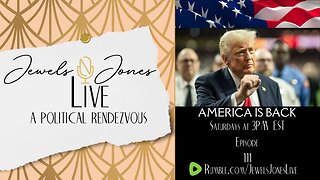Premium Only Content

Liberty, Health, and Addiction: Caroline McCaughey's Insights
Caroline McCaughey, a writer for the New York Sun, notes, "People are signing a pledge, people who are libertarian-leaning or they call them liberty lovers, are signing a pledge, picking up their lives, and moving to New Hampshire for this free state project. I do have some libertarian leanings. I wouldn't call myself a libertarian.”
This pursuit of liberty resonated deeply with her, as did exploring societal issues like the "loneliness epidemic" and the "decline of the church, of civic institutions, all this stuff when you talk about deaths of despair"– in the age of covid lockdowns and restrictions. Her insights into the social fabric of America are sharp. "People always talk about the loneliness epidemic. Decline of the church, of civic institutions, all this stuff when you talk about deaths of despair," she observes. These changes, she believes, impact public health and community well-being.
Ms. McCaughey's work examines the intersection of personal freedom and public policy, especially in addiction and health. She supports replacement therapies, stating, "I think there is a place for those replacement therapies that can help kind of bridge you over (and for needle exchanges)".
Dr. Bock’s contrary concern is that harm reduction may perpetuate addiction by making drug use safer rather than encouraging recovery. "If you make the heroin free and needles free, then people don't need to go into treatment," is a significant argument against such policies. This perspective emphasizes the need for strategies that promote long-term recovery and societal reintegration. "Statistically, amongst the things that give you the largest addition to life expectancy are community things, going to church, being married to the same partner," highlights the value of strong social bonds in promoting health and well-being.
McCaughey's insights into addiction come from personal experience. During her senior year of college, she tried heroin, initially trivializing it as a fun thing. "I tried it that one time, my senior year of college. I graduated college, moved in with that boyfriend in the East Village of Manhattan. And it kind of happened quickly, but I didn't really notice it," she recalls. What started as occasional use soon became a consuming addiction, gradually taking over her life. She describes how her use escalated, leading to physical dependence and ultimately, significant personal losses. "I lost my job... I was spending a lot of money. I mean, hundreds of dollars a day. And then I started adding cocaine to the mix to stay awake, and then I really liked that," she shares. Her story is a stark reminder of how easily addiction can take hold and disrupt one's life.
Today, Caroline lives a fulfilling life in New Hampshire with her husband and two children, free from addiction and without the need for replacement treatments. As an articulate writer and political reporter, she covers a range of topics through her work, showing an underlying commitment to liberty and personal responsibility. Her journey underscores the possibility of overcoming addiction and living one's best life through self-reliance and strong family and community ties, far removed from solipsism and destructive habits.
-
 LIVE
LIVE
Jewels Jones Live ®
1 day agoAMERICA IS BACK | A Political Rendezvous - Ep. 111
1,795 watching -
 LIVE
LIVE
Due Dissidence
1 day agoLIVE: Workers Strike Back Conference ft. Chris Hedges, Jill Stein, Kshama Sawant, and More!
1,632 watching -
 8:36:37
8:36:37
Right Side Broadcasting Network
5 days agoLIVE REPLAY: CPAC 2025 Day Three with President Donald J. Trump - 2/22/25
271K84 -
 1:05:34
1:05:34
The Big Mig™
10 hours agoConfirmed Kash Patel New FBI Director, Bring On The Pain |EP483
37.9K13 -
 53:59
53:59
Tactical Advisor
6 hours agoThe Vault Room Podcast 009 | Everyone Getting $5000?!
37.5K7 -
 2:04:44
2:04:44
TheAlecLaceShow
17 hours agoLive at CPAC | Interviews with Dean Cain, Rep. Comer and more! | The Alec Lace Show
51.2K3 -
 LIVE
LIVE
Major League Fishing
3 days agoLIVE Tackle Warehouse Invitationals, Stop 1, Day 2
191 watching -
 3:12:37
3:12:37
I_Came_With_Fire_Podcast
14 hours agoNOC Spy: CIA uses SATANIC RITUAL ABUSE to make SLEEPER Cells
38.9K9 -
 28:42
28:42
CatfishedOnline
1 day ago $2.43 earnedWoman Insists Morgan Wallen Relationship Isn't a Romance Scam!
36.4K1 -
 16:25
16:25
TSPLY
1 day agoNew CNN / MSNBC Meltdown Moments Of Getting Mad At Donald Trump In February
38.9K26